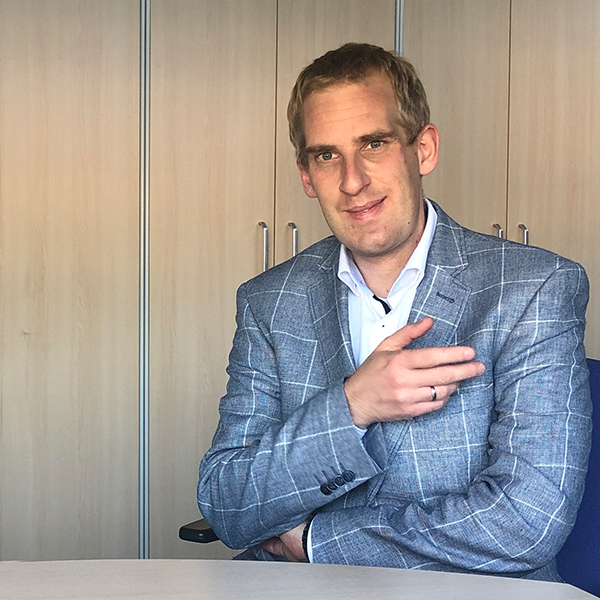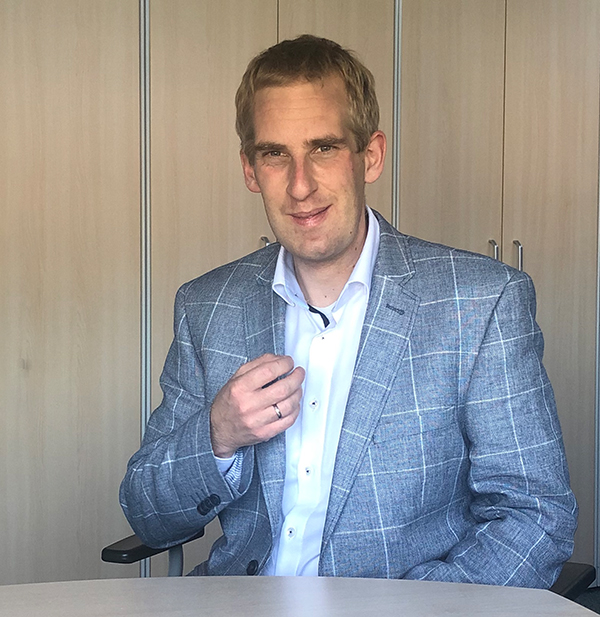PLM made possible through the networking of products
Interview with Jens Christian Göbel
Last year, Professor Dr. Jens C. Göbel took over as successor to Professor Martin Eigner as the head of the Institute for Virtual Product Engineering at the University of Kaiserslautern. He has already been concerned with PLM-related topics for many years, both at research level and with regard to industrial applications. In an interview for the PROSTEP Newsletter, he explained what the future of PLM will look like.
Question: What are the technological trends that PLM users and vendors are going to have to get to grips with?
Göbel: In the future, smart product systems with integrated services that are very closely networked and form part of other systems (systems of systems) will play a much more central role in product lifecycle management. The end-to-end implementation of PLM concepts throughout the entire product lifecycle will, on the one hand, be made possible for the first time by this networking capability and, on the other, is also urgently required – for example in order to permit the integrated management of digital product twins. PLM is therefore a vital underpinning for the lifecycle of smart products. However, PLM will have to open out and develop in different directions if it is to achieve this aim. This applies, for example, to the integration of other specialist disciplines in the very early systems engineering phases, the inclusion of product instances in later product utilization phases, and the use of AI for the purposes of “engineering intelligence”.
Question: Where do you see the greatest obstacles to the implementation and optimization of PLM applications in industry?
Göbel: Many of the obstacles hindering PLM implementation continue to be of an organizational nature or relate to the field of project or acceptance management. At the same time, however, increasing functional scope and, most importantly, integration capabilities, are making the implementation of PLM solutions even more complex. We will need new skills that include the digitalization of the products themselves and combine this with the digitalization of the processes in the product lifecycle. However, the progress of PLM implementation is being helped by industry’s increasing awareness of the correlation between standard PLM tasks and the success of digital transformation in the engineering field, as well as throughout the entire product lifecycle.
Question: Do companies have the necessary technical PLM skills, for example in order to develop smart products and services?
Göbel: Far from it! The offering of smart products and services is directly linked to the enterprise-specific design of new business models and flexible collaboration models. At this level, it will be necessary to create PLM interfaces and extensions that reach through to the very early innovation and product planning processes. This will require a fundamental mind shift in individual specialist departments as well as in PLM and IT departments. Another current challenge, in particular in large companies, is the PLM-specific integration of and cooperation between somewhat traditional company departments and highly agile start-up divisions.
Question: What role do currently hyped-up topics such as the digital thread and the digital twin play with regard to the strategic importance of PLM in companies?
Göbel: Generally speaking, it can be seen that companies have recognized that PLM is key and forms a vital basis for these issues. That is why it is often becoming the focus of strategic enterprise initiatives to a much greater extent than before and is being considered from a number of very new perspectives. However, to avoid false expectations and unrealistic ideas of the potential benefits, we need to be clear about what these terms mean and consider them against the background of concrete application scenarios, that is to say not as an end in themselves. At the VPE, we have already shown that this is possible in a number of research projects, e.g. in the case of the use of digital product twins for service-based business models in the agricultural machinery and automotive industries.
Question: It is said that monolithic PLM systems are no longer in fashion. However, PLM vendors are constantly extending their solutions with new modules. Isn’t that a contradiction?
Göbel: PLM solutions must continue to develop radically at both the functional and technological levels if they are to keep up with the fast-moving dynamics that characterize products and business models. In this context, the integrative nature of PLM is of particular importance. It is becoming increasingly important that other discipline-specific IT systems and platforms be integrated quickly and easily throughout the entire product lifecycle, including for temporary applications. It is therefore vital for success that PLM vendors keep their promises regarding openness and press ahead even further in this direction, including in joint initiatives such as the prostep ivip Association’s Code of PLM Openness (CPO).
Question: You wrote your doctoral thesis on the harmonization of hybrid PLM environments. Has industry made progress in this area on recent years?
Göbel: Yes, it has been pleasing to see the visible progress and success achieved in the field of PLM harmonization in recent years. Businesses have learned from the past and pursued more methodical approaches that consider processes, methods, IT systems and company organization more holistically. However, this topic is still extremely relevant today. Here, too, technological further developments and additional PLM requirements are demanding new approaches, for example the use of semantic technologies for linking data; in this context, we refer to this as semantic PLM.
Question: Do we maybe need something like a meta-PLM system that links together the data from the different data silos?
Göbel: In principle, yes. But it mustn’t be rigid. Any such meta-PLM will have to keep pace with the ever faster dynamics of internal organizational structures and value-added networks. For example, in the AKKORD project, which was recently launched by the German Ministry of Education and Research (BMBF), we are working together with various industries to achieve intelligent data networking in the product lifecycle. In this project, we are attempting to flexibly integrate not only PLM but also ERP, CRM and other systems and perform AI-based product data analysis, for example in order to exclude possible sources of error and predict costs on the basis of quality data as early as the development phase.
Question: No other organization is working harder to further develop the PLM concept in the direction of SysLM than the VPE Institute. With which of these terms do you identify most?
Göbel: For me, the content that stands behind the terms is more important than the terms themselves, which in any case are not used uniformly. We will orient the development of PLM in the direction of the aspects we have discussed – and in some areas will have to completely rethink it. The concept of SysLM primarily reflects the idea of an interdisciplinary systems approach, which is increasing taking the place of our traditional product concept. As such, this term represents an important element of these further developments. However, it is not the only direction of PLM development that we are working on.
Question: In the future, where will you place the emphasis in terms of research and teaching? Is MBSE still at the very top of the curriculum?
Göbel: MBSE continues to be our central topic, in particular as an “enabler” for smart engineering. For example, we are currently taking part in a large interdisciplinary research project involving the knowledge-based roadmapping and cross-value chain modeling of overall system architectures in very early innovation phases in the automotive industry. A few weeks ago, we became one of the first German university research institutes to be included in the OMG’s SysML v2 Submission Team (SST), where we will help design the next SysML generation. We are currently incorporating the results of our research activities in a new cross-discipline “Smart Systems Engineering” study module which we, together with colleagues from the IT and Electronic Engineering departments, will offer in the upcoming winter semester. We opened the e4lab (engineering 4.0 lab) demonstration and testing laboratory in Kaiserslautern last July with the aim of making the potential applications of our research results tangible and accessible for industrial enterprises. These are just a few examples – many more will follow. Be ready to be surprised!
Question: The digitized engineering conference SYSLM2019 will be held in Kaiserslautern in October. Why has the name of this event been changed?
Göbel: We at the VPE have been working on the digitalization of engineering ever since the institute was founded by Professor Dankwort in 1994, that is to say for 25 years. I think that the name very accurately expresses this overarching core idea and also emphasizes the key topics we are addressing today. In the future, we want to direct even greater attention forward towards visionary ideas and trends that are also of relevance to industry in order to provide a guide for participants and stimulate an inspirational dialog about the future of digital engineering. I am very much looking forward to this year’s program, which contains some top-quality contributions, including the participation of PROSTEP AG, and is therefore ideal for promoting just such a dialog.
Mr. Göbel, thank you very much for talking to me.
(This interview was conducted by Michael Wendenburg)
About Jens C. Göbel
Professor Dr. Jens C. Göbel has headed up the Institute for Virtual Product Engineering (VPE) at the University of Kaiserslautern since 2018. Göbel studied industrial engineering (mechanical engineering) at the University of Siegen. After graduating, he worked on PLM-related topics at Bosch Rexroth, Keiper Recaro and Schmitz Cargobull and also conducted research into the fundamental principles of the lifecycle management of integrated product-service systems at Bochum University. There, he wrote his doctoral thesis on the harmonization of hybrid PLM environments at the Department of Information Technology in Mechanical Engineering under Professor Dr.-Ing. Michael Abramovici. Since 2010, he has served as research coordinator and senior engineer and head of the Lifecycle Management research group in the same department.
|



